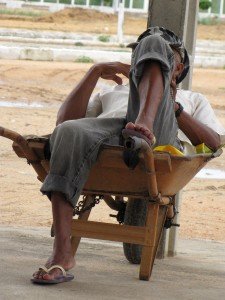Argentine Spanish is strewn with words and colorful phrases from Lunfardo, a rich vocabulary born on the streets of Buenos Aires in the second half of the 19th century. Now considered a fixture of the Spanish language in Argentina (especially in and around Buenos Aires) and Uruguay, linguists cite the use of Lunfardo as a defining characteristic of the Rioplatense dialect. Add a dash of Argentine flavor to your Spanish vocabulary with the Transpanish blog’s ongoing feature highlighting some of the most frequently used terms in Lunfardo.
In Lunfardo, the word “fiaca” is a noun that means “the feeling or state of being bored, idle, slothful or unmotivated.” When used to refer to a person, possible English translations of the word “fiaca” include lazybones, lazyhead, bum, layabout, and idler.
The Lunfardo word “fiaca” is said to have originated from the Genoese dialect of Italian. In that dialect, the word makes reference to “a lack of energy/tiredness attributed to missing a meal.”
Related words in Lunfardo:
verb hacer fiaca: laze about, bum around
Usage examples: ¡Qué fiaca que tengo! // Man, I feel like a slug today!
Los domingos me gusta hacer fiaca. // I like to laze about on Sundays.
The song “Doña Fiaca,” written by Eladia Blázquez, prominently features the word “fiaca” in the title and lyrics.
La fiaca no es pereza, no es descanso,
Es una sutileza de algo más.
Una melange de todo a nuestro modo
Un rasgo del folklore nacional.
La fiaca, es una filosofía
De la antigana de no hacer, del no querer,
La diosa del desgano y de la cama
Y la madam de la comodité.
Y convengamos que es un poco pastenaca
Aquel que nunca le da la fiaca,
Hasta el mismísimo Ministro de Trabajo
Su golpe bajo, debe amagar.
La gente fina la bautiza en su lirismo
Como ausentismo, pero es lo mismo,
Y doña fiaca es una mina que domina
En casa, en la oficina y en toda la nación.
Si alguno ha pensado en vacunarse,
Lo siento, pierde el tiempo sin razón.
La fiaca, sin remedio, va a atacarle
Porque es igual al virus de Hong Kong.
No teman, el mayor de los incordios
Serán las ganas que le den de apoliyar.
Si en alguien, el bostezo se hace gordo,
Llamen al “tordo”, que lo va a curar.








